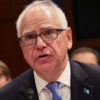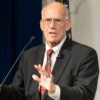Conservatives of the House Freedom Caucus have cleared the way for Rep. Paul Ryan to become speaker—if he wants it.
A supermajority of the roughly 40-member Freedom Caucus pledged in an internal vote that they will support Ryan if he were to run for speaker of the House.
But by Freedom Caucus rules, this level of support fell short of the fourth-fifths majority required for a full-fledged endorsement.
“We are supporting him with a supermajority vote but we are not endorsing him,” Rep. John Fleming, a Freedom Caucus founder, told The Daily Signal.
“It basically means that those who voted to support him will continue to vote for him, and those who didn’t I’m sure will not. I think he has the votes to become speaker; the question is does he have the votes that suit him. He says he wants the endorsement. He fell short of that, but he does have overwhelming support. It’s up to him what that means beyond that.”
In announcing his conditions to run for speaker on Tuesday, Ryan said he would require the endorsement of the three House Republican groups, including the Freedom Caucus. The other two, the moderate Tuesday Group and conservative Republican Study Committee, are expected to easily endorse Ryan.
While Ryan did not get an official Freedom Caucus endorsement, the level of support he got from its members ensures he has more than enough votes to secure the 218 needed to become speaker of the House. Now it’s up to Ryan if this is the sweeping support he was looking for.
In a statement late Wednesday, Ryan sounded like a man ready to run for speaker, expressing appreciation for the Freedom Caucus’ support.
My statement after a meeting of the House Freedom Caucus: pic.twitter.com/lxmzBrUcms
— Paul Ryan (@PRyan) October 22, 2015
Fleming and other Freedom Caucus members indicated that they were satisfied with Ryan’s level of commitment to “process reforms” they seek in how the House does business.
“Paul is a policy entrepreneur who has developed conservative reforms dealing with a wide variety of subjects, and he has promised to be an ideas-focused speaker who will advance limited government principles and devolve power to the membership,” the Freedom Caucus said in an official statement. “While no consensus exists among members of the House Freedom Caucus regarding chairman Ryan’s preconditions for serving, we believe that these issues can be resolved within our conference in due time.”
The Freedom Caucus met with Ryan Wednesday afternoon, where they walked away satisfied with his agenda, even though he did not commit to specific rule changes.
Ryan has vowed to return to “regular order,” a process by which bills go through committee first, and votes occur separately on the 12 appropriations bills instead. Regular order also entails an open amendment process.
“He agreed a lot of the changes needed to be made,” Rep. Barry Loudermilk, R-Ga., of the Freedom Caucus told The Daily Signal.
“What I was specifically listening for is if he would support a bottom-up approach. I don’t want him to say, ‘I agree with you, I will make these exact changes.’ Because then that would be allowing what we are against to benefit ourselves. What he did say is, ‘I agree we need to come together as Congress to make change,’ and that’s what I was looking for.”
Even with the support from the Freedom Caucus, outstanding issues remain.
Most importantly, Ryan has indicated he wants to change the process of how House lawmakers could use a tool to remove a speaker if they are upset with his performance.
Conservatives insist the tool—called a “motion to vacate” the chair—can provide accountability to the job of House speaker.
In July, Rep. Mark Meadows, R-N.C., a Freedom Caucus founder, presented a motion to vacate the chair against Speaker John Boehner, though the House never voted on the measure.
As the rule stands now, only a majority vote is required for the resolution to succeed.
Ryan, according to Freedom Caucus lawmakers, has indicated he wants to raise the voting threshold on vacating the chair—not necessarily eliminate it.
It’s still unclear if conservatives would support that effort.
“He clarified today that it’s his intention to modify it, where the minority cannot use that against the majority,” Loudermilk said. “There’s some validity in that.”
Supporters of Ryan reacted positively to the Freedom Caucus’ vote.
“I think that’s a very good sign and I hope it’s good enough for Paul Ryan,” said Rep. Jason Chaffetz, who dropped out of the speaker race to support Ryan.
Chaffetz, R-Utah, in an interview with The Daily Signal, continued:
“He is the right guy at the right time. To get that high of a percentage from [the Freedom Caucus], you’re probably not going to get much better than that.”
One member of the Freedom Caucus even went outside the bounds of the group to personally endorse Ryan.
“I know I will not always agree with decisions made by leadership,” Rep. Marlin Stutzman, R-Ind., said in a statement. “However, on the major issues of the day, there is no doubt that Paul Ryan is the person best positioned to lead our party and refocus our conference on the spending issues I came here to tackle.”
Boehner, the outgoing speaker, announced Wednesday that Republicans will vote internally to nominate a speaker next Wednesday, Oct. 28, with a floor vote to follow Thursday, Oct. 29.
If Ryan officially gets in the race, he will run against Rep. Daniel Webster, R-Fla., who—even after the Freedom Caucus’ vote—has vowed to continue his quest to become speaker.
Ultimately, for a group who has pledged to support a process over a person, many Freedom Caucus members say finding the next speaker is bigger than them, even if Ryan is the one.
“I have every conviction that in his heart and soul he [Ryan] has a commitment to pass the republic along to coming generations so they might also walk in the light of freedom as we have,” Rep. Trent Franks, a Freedom Caucus member from Arizona, told The Daily Signal.
“The objective of the Freedom Caucus is to do what is truly right for America,” Franks added. “With that in mind, it’s important to have the ability to articulate a clear vision that resonates in the hearts of Americans. Paul has the acumen to do that.”
Philip Wegmann contributed to this story.































